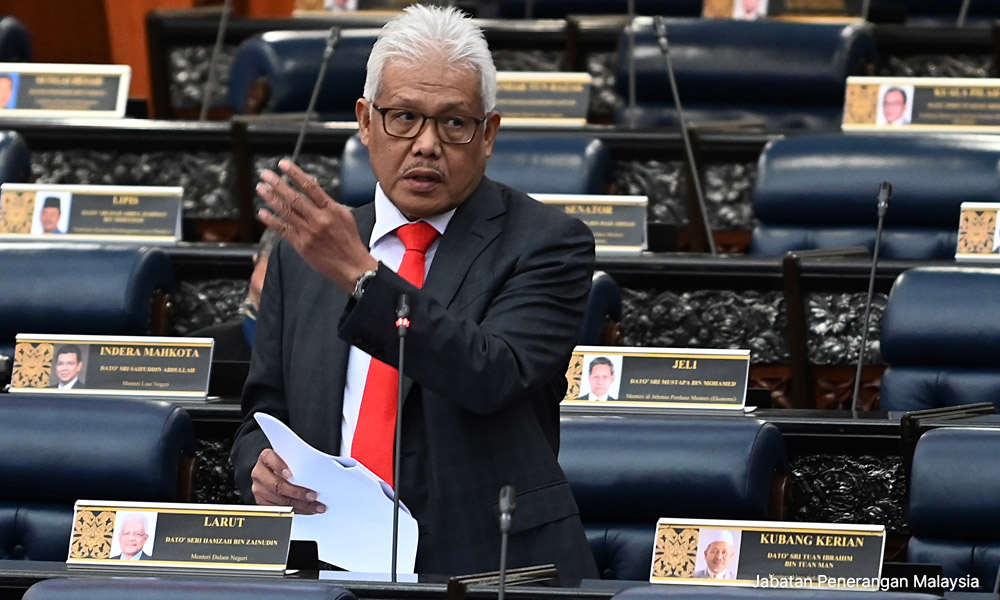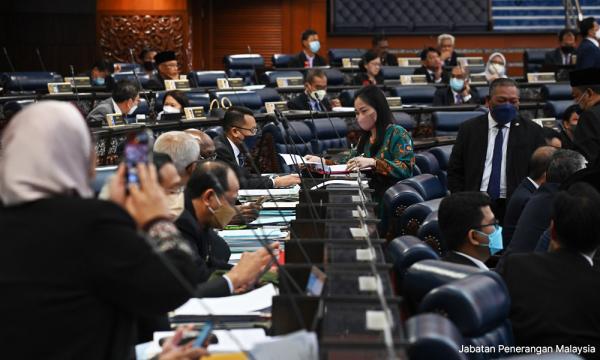MP SPEAKS | Yesterday, the government, via the home minister, mooted a motion to extend the application of Section 4 (5) of the Security Offences (Special Measures) Act 2012 or Sosma for another period of five years. In law, it is known as a sunset clause, ie it has a certain life span.
The motion was made pursuant to subsection 11 of section 4 of the same Act. Unfortunately, the motion was approved despite opposition MPs' strenuous objections.
In gaining the necessary support from all the MPs in approving the motion, Home Minister Hamzah Zainudin told the Dewan Rakyat that the police badly need the said legislation in order to curb security offences as well as other serious crimes such as terrorism.
In other words, he was trying to play with emotions in order to woo sympathy.
The way the minister presented the motion he seemed to be implying as if those who object to the motion were supporting the criminals and their crimes.
It was not certain how he viewed the detention of Maria Chin Abdullah, Khairuddin Hassan and Matthias Chang respectively under this obnoxious law?
Going by his pathetic logic, all these three personalities would seem to have fallen under the category of "the suspected terrorists".
Anyway, Sosma is a procedural law which seeks to regulate criminal trials for certain offences laid down in the Penal Code, Prevention of Terrorism Act (Pota) as well as Prevention of Crimes Act (Poca) respectively.
By virtue of this repressive law, as far as those aforementioned crimes are concerned, the Criminal Procedure Code would no longer be applicable.
Undesired problems
One may ask, what is the problem then?
My short answer would be the trial under Sosma would produce an avalanche of undesired problems.
Having read and studied carefully all the 32 provisions in Sosma, I dare to say that Sosma has been specifically designed in order to help the prosecution to win the trial and in turn secure a conviction against the accused person at all costs.
Yes, it is prosecution-friendly legislation. Be that as it may, it does not care at all about the need to provide a fair trial to the accused person. As far as Sosma is concerned, the rule of law is insignificant.
Let me reiterate herein that in a criminal trial, as pointed out by Helena Kennedy QC in her book Just Law, there are some fundamental traits of criminal law which should be jealously safeguarded, for instance, the universal doctrine of the presumption of innocence.
All these basic principles are based on this underlying premise, ie in a criminal trial, any helpless criminal suspect has to face the almighty state with all the powerful machinery at its disposal.
There will be never any equality of arms as far as a criminal trial is concerned thus all the basic criminal precepts which are seen to be relatively favourable to the accused person ought not to be disturbed.
A criminal proceeding is also intrusive in nature. By virtue of that, assuming the trial is conducted under a draconian law like Sosma, it would serve as a double whammy against the accused person.

Let us duly consider certain draconian provisions in Sosma.
Take for example Section 30 of the Act. It is submitted that from this draconian provision one may safely conclude that there are three baffling elements therein.
First, the section gives enormous powers to the prosecutions in order to help them to win the trial at all costs.
Secondly, the provision does not really care about the liberty of the accused person despite the fact he may be found not guilty by the court of the first instance.
He will still be denied from immediately reaping the fruits of the acquittal judgement in his favour. The prosecution can still ask the court to remand the accused person further despite the latter's victory.
Thirdly, out of this controversial section, the judges' hands are tightly tied down so much so they have to be subservient to the prosecution's commands.
This repressive law also trumps the supremacy of the Federal Constitution in that the law allows certain provisions therein to supersede the apex law.
For instance, section 4 (10) of the Act overrides Articles 5 and 9 respectively of the Federal Constitution. Thus, despite the fact our apex law guarantees the rights of the accused person to be only remanded by a court of law namely via a magistrate's order, Sosma authorises the police to further remand the accused person for a period of 28 days though the arrest is also done by the police.
It is simply a case whereby a police officer is asking another police officer to further detain a police suspect in police custody!
Highly prejudicial against accused
Apart from that, Sosma shall also take effect notwithstanding it contravenes section 117 of the Criminal Procedure Code or CPC which only permits the court to further remand any suspect for a maximum period of 14 days only.
Sosma also justifies any evidence-gathering process to be inconsistent with the Evidence Act 1950. In other words, any evidence which may be tainted and inadmissible in the CPC-related trial would still be acceptable and admissible under Sosma.
No doubt, it would be highly prejudicial against the accused person. Would Sosma or the prosecution care?
All in all, Sosma is a bad law. One may ask why the Pakatan Harapan government did not repeal or amend it at least?
Truth be said, Sosma and some other repressive laws were in the pipeline back then to be seriously reviewed by the Harapan government with a view either to repeal or amend it.
We, for instance, managed to repeal a law on fake news despite the fact we had to face the first rejection in the senate on our first attempt.
Of course, we never expected to be unduly halted in carrying out our job by Sheraton Move within 22 months in power.
MOHAMED HANIPA MAIDIN is Sepang MP.
The views expressed here are those of the author/contributor and do not necessarily represent the views of Malaysiakini.


